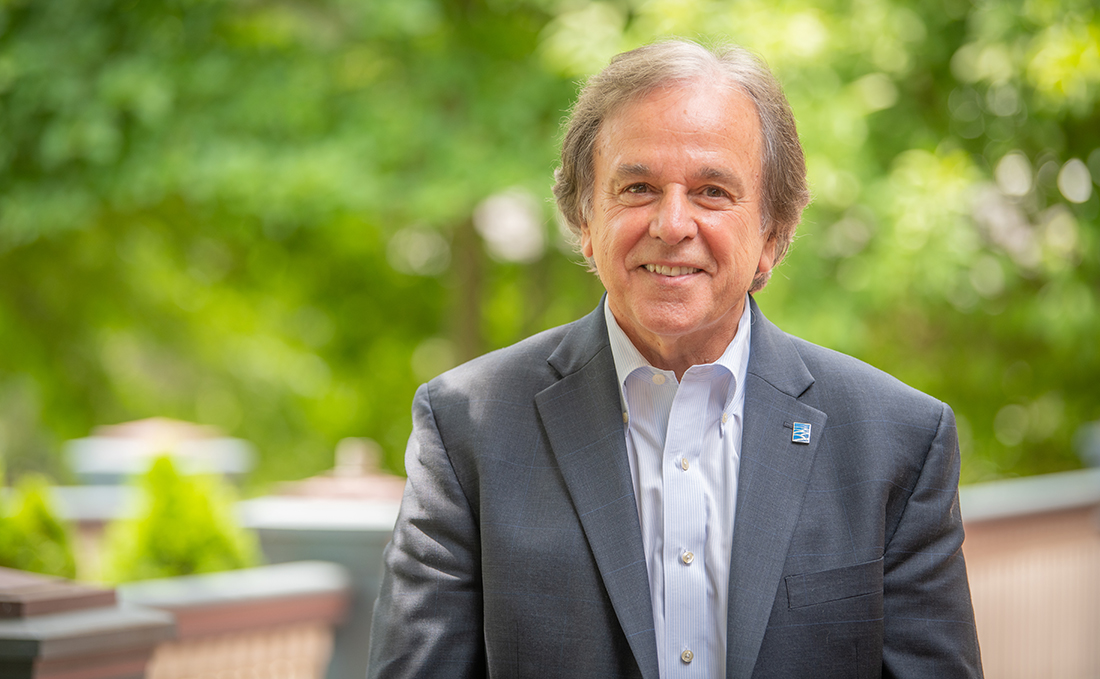‘I’m not good at treading water’

On July 1, following a 50-year career — 28 of those as CEO of Seven Hills Foundation & Affiliates, which operates more than 250 clinics, schools, and other facilities across Massachusetts, Rhode Island, and in eight developing countries — David Jordan took a well-earned retirement. His home and boat on Martha’s Vineyard beckoned, and he was ready to ease back on the throttle.
That lasted a week.
With the encouragement of President David Fithian and Provost Sebastián Royo, Jordan accepted the position of interim dean of the School of Management for the coming academic year, following Alan Eisner’s decision to step down as dean and return to a faculty position. Jordan began in the role on Monday.
“If it was anything else, I would have said no, but this is Clark,” Jordan said in an interview on Monday from his office in Carlson Hall. “I’ve always loved Clark, and I love the students here. This is more of a calling than anything else.”
His connection to Clark University runs deep. Jordan earned a master’s in public administration here in 2002 (while simultaneously pursuing his doctorate in health administration from the Medical University of South Carolina). For nearly 20 years Jordan has served as an adjunct professor in SOM, the School of Professional Studies, and the Entrepreneurship and Innovation program. Since 2009 he has led Clark students who are interested in social change and social entrepreneurship on research and experiential learning/global citizenship trips to Ghana, Guatemala, Bangladesh, Sierra Leone, Liberia, Kenya, Jamaica, Brazil, Haiti, and elsewhere.
His research and teaching have focused on strategic management, public policy and administration, health care administration, strategic marketing, and social entrepreneurship. In 2007, then-President John Bassett named Jordan Clark University’s first Social Entrepreneur-in-Residence.
“Clark has always been important to me, because these are the folks who will drive the change that changes the world,” he says. “The university has produced young people who are doing amazing things in every part of the globe. It’s why my passion for teaching has never waned.”
He has not come to SOM to be a seat warmer. “I’m not good at treading water,” he says with a laugh. “Never have been.” Jordan anticipates participating in “significant listening sessions” with faculty, staff, and alumni over the next month to “get a sense of where they’d like to see SOM.”
“My hope is that we will become an incubator for innovation, not only within SOM but in collaboration with departments across the university,” he says. “I want us to imagine how we can co-create innovation throughout the campus, in the business community, and within the health and human services community.”
Jordan has already begun a dialogue with the Worcester Regional Chamber of Commerce about merging SOM’s capabilities with the chamber’s resources to provide direct access to jobs and internships for Clark students.
He’s particularly excited by the prospect of establishing a Yunus Social Business Centre on campus. Originated by Muhammed Yunus, a world-renowned social entrepreneur and Nobel Peace Prize laureate, the business centers are hubs where students, academics, and researchers engage in fresh thinking about how to address longstanding problems of poverty, inequality, unemployment, and degradation “in a sustainable and effective way,” using the principles of “social business” developed by Yunus.
Jordan, who considers Yunus a good friend, is confident that Clark’s application will be approved to host one of the centers, of which there are 90 around the world. Clark’s center would be one of only two or three in the United States.
“This would immediately connect us to top-level universities around the globe and create opportunities for shared faculty, shared student experiences, shared travel experiences,” he says. “It would give SOM a new dimension that is totally in keeping with our philosophy of challenging convention and changing the world.
“We want to be part of that leading edge of advancing a new perspective on the relevance of a business degree in today’s society. We’re not just about teaching kids how to make a bunch of money, but we’re trying to make them responsible business leaders — and social business is the way.”
Jordan says the expertise and experience that exist in the School of Management are distinct advantages as SOM moves forward with novel ideas and approaches.
“All I want to do is something significant that benefits students here. That’s my end game; nothing else really matters,” he says. “We always need to go back to the ‘why’ of what we’re doing, and the answer to ‘why’ is always our students. They’re everything.”


